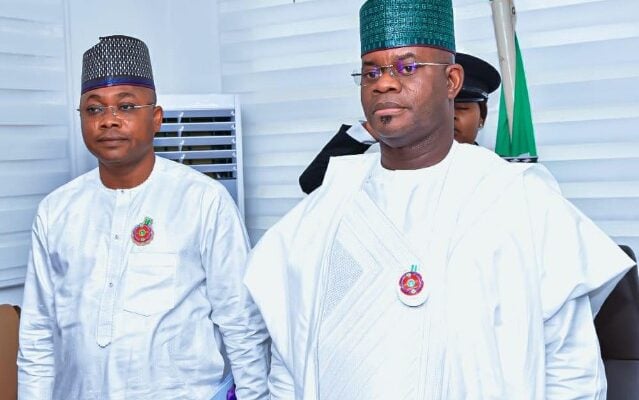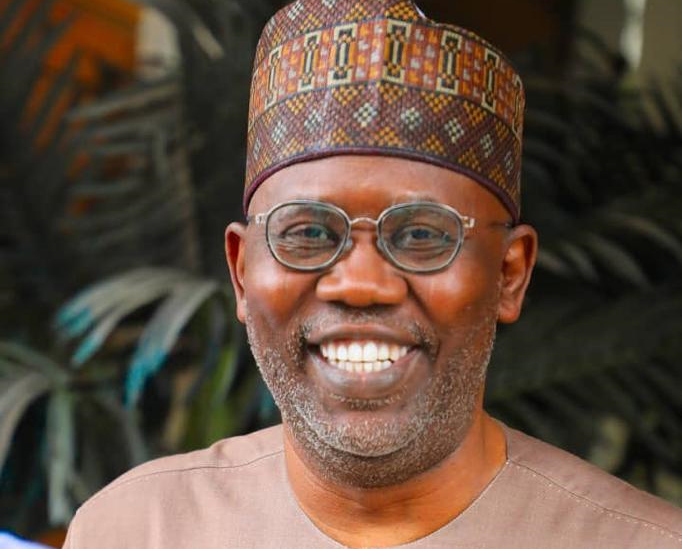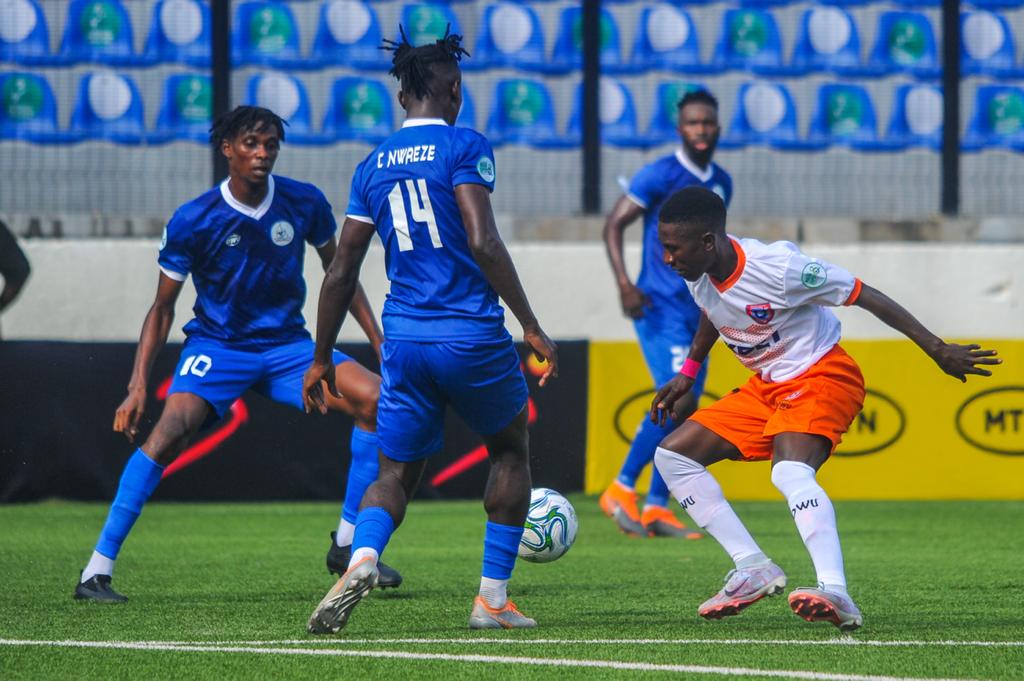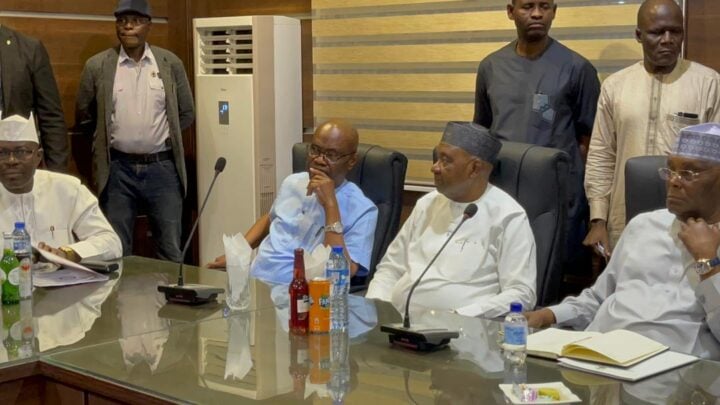File photo. Bello, right, handpicked Ododo as his successor |
There is hardly anything I find most offensive like when somebody refers to my country, your country, our country — Nigeria, as a theatre of absurdity. Why? Because Nigeria is the only country I have, like millions of other Nigerians. I have never stepped a foot outside the shores of this country since I was born, so the issue of dual nationality is out of the equation.
Without minding the existence of some black sheep, Nigeria generally speaking, is a country of good people. I, therefore, won’t accept any definition of her, based on isolated cases of irrationality, or moments of indiscretion by those who constitute a very minute fraction of the population, who by accident of history and uncommon political circumstances, find themselves in positions of power. Will you choose an individual who succumbed to his base instinct as your benchmark of “who is a Nigerian?” I won’t swallow that phlegm, in the name of decorum.
Upon a critical analysis, however, one would realise that they’re somewhat correct, referring to the country, using such a derogatory term. They’re right in the sense that, even if the dramatis personae on that stage of absurdity are in the minority, the rest of us who are in the majority carry on, as if nothing happened. We condone impunity, for the most ludicrous of reasons. We are, therefore, complicit, and guilty as charged, in nurturing and sustaining that culture, at every level.
The latest of such impunity is the ongoing saga between the Economic and Financial Crimes Commission (EFCC), and the immediate past governor of Kogi state, Yahaya Adoza Bello. The former governor was accused by the EFCC of an alleged misappropriation of various sums of money belonging to the Kogi State Government. The anti-graft agency accused him, his nephew Ali Bello, Dauda Suleiman, and Abdulsalam Hudu (said to still be at large) of conspiring to convert the total sum of ₦80.2 billion of public funds to personal use in February 2016. He was also alleged to have withdrawn $720,000 belonging to the people of Kogi state for personal use, shortly before he handed over as the governor, on January 27 this year. All these and more were alleged to have taken place between January 2016, and January 2024 when his tenures expired.
Advertisement
This is not the first time an anti-graft agency, especially the EFCC, would be indicting and inviting an ex-governor, to come and answer questions bordering on such allegations of financial malfeasance. That means, Bello was not the first to be indicted/invited, and he definitely won’t be the last. Even in 2018, Ayo Fayose, before he finished his tenure, grapevine had it then that he would be arrested once he left office, by the agency and arraigned. But what did Fayose do? Days, after handing over power to his successor in office, he drove straight to the Abuja office of the EFCC, donning a T-shirt with the inscription, “EFCC, I’m here”. And Fayose was neither detained indefinitely nor killed afterwards. He was charged as rumoured, but then granted bail, and the legal dogfight began and is still ongoing as we speak. While the case dragged on, Fayose had even run for the PDP presidential primary election (in 2022). Not that alone, he regularly comments on burning issues of national importance on national television, and grants interviews to journalists in both print and electronic media. He enjoys his “Amala and Abula” soup, whether he is in Ekiti or Lagos state. He’d even gone abroad for medical treatment and returned to enjoying his life, as though the EFCC had stopped being on his case. That is the beauty of the justice system.
But in the latest case between the self-styled “White Lion”, as Yahaya Bello is fondly called by his admirers, as well as hangers-on, and the EFCC, I learnt the accused had, earlier in February this year, sought, and got an injunction from a Kogi state high court, sitting in Lokoja. The injunction restrains the anti-graft agency, from arresting/inviting, and prosecuting him. But who does that? (I digress).
While the restraining order subsists, it was reported last week, by virtually all popular media platforms in the country that, EFCC operatives arrived at Mr. Bello’s house at about 9.30a.m, on Wednesday, the 17th of April 2024, in a bid to effect his arrest, ahead of his planned arraignment the following day. They mounted a barricade on the streets around the house, located on Benghazi Street in Wuse Zone 4, Federal Capital Territory. But the security details of the former governor, consisting of policemen and women, as well operatives of the State Security Service (SSS) reportedly prevented the EFCC from arresting him based on an arrest warrant issued by a Federal High Court, sitting in Abuja. Reports have it that the police personnel guarding him had been withdrawn on the order of the Inspector-General of Police, arrested and detained, for obstructing the EFCC in the course of their duty.
Advertisement
While the siege on Bello’s residence was ongoing, the incumbent governor of Kogi state, Usman Ododo, reportedly drove in, in an apparent show of solidarity with his predecessor, and political benefactor. He would later play the role of a hero, by rescuing the suspect, preventing him from being arrested. Ododo reportedly drove away with Bello about two hours after he drove in, leaving, helpless, the operatives who had laid a siege on the residence for hours.
Governor Ododo was able to get himself a role in the “movie” without consequences because of the instrumentality of section 308 of the 1999 constitution which grants immunity from criminal proceedings to the president, the vice president, governors and their deputies. They did not, or could not stop and search the vehicle to get their man, due to the regard they have for the office of the governor, even though, they knew Bello was in the vehicle.
I am not in a position to comment or express an opinion, on the legality or otherwise of the EFCC’s attempt to get Bello arrested because Law is not my area of core competence. But I do not think it is proper, to follow closely, the Administration of Criminal Justice Act (ACJA) 2015, as it is an offence to prevent a law enforcement agency from carrying out their lawful duties. It would be very tempting for Yahaya Bello’s sympathisers to argue that the EFCC acted in defiance of a subsisting court injunction. But they need to be reminded that you can’t solve illegality with illegality. Unfortunately, that was what Ododo did at Bello’s Wuse residence on that day – “resisting/preventing an arrest.” If you feel it is wrong according to the law for the EFCC to arrest Bello, based on an arrest warrant duly issued by the court, you should have, at least, waited for them to do it so that you may challenge the action in the law court.
If Ododo’s action is hinged on him preventing the arrest of his political benefactor in obedience to the restraining order from the Kogi State High Court, in the process he has violated a provision of the ACJA 2015, as it is not in his place as a governor to enforce the court order. While trying to enforce a provision of the law, he has equally broken a section of the ACJA 2015. He’d also abused, in letter and spirit, section 308. Governor Ododo needs to be schooled by his Attorney-General and Commissioner for Justice, if he has one, that his immunity from criminal proceedings, provided for in section 308 is first and foremost, not transferable or expandable to cover persons apart from those mentioned in subsection 3. Secondly, beneficiaries enjoy it only while they’re in office. But once they’ve come to the end of their tenures, they’re off the list of those who enjoy the “constitutional largesse’. That settles Bello’s case, who had been a beneficiary of the clause for the past eight years.
Advertisement
Meanwhile, those who have been advocating for the abrogation of section (308) did not even factor this kind of situation (possible expansion of the scope) into their reasons. But here we are, watching as governors extend the frontier of impunity with the abuse of the law that is a subject of moral questioning. It is bad enough to have the hands of law enforcement agencies tied as far as prosecuting any offending incumbent governor, his deputy, the president, and the vice president, is concerned.
Widening the scope of the immunity is one impunity that Nigerians should not tolerate. The Israeli Prime Minister, Benjamin Netanyahu, has been undergoing trial on allegations of fraud, bribery, and breach of trust in three cases filed in 2019, known as Case 1,000, 2,000 and 4,000. That is the way it should be in Nigeria, considering how endemic corruption is, in the system, and our resolve to at least, reduce it to the barest minimum, if not eradicate it. As we speak, the immediate past president of the United States of America, Donald Trump is standing trial for some offences he allegedly committed while in office. Nobody is obstructing the law enforcement agents from doing their job over there.
In light of what happened last Wednesday, it is high time critical stakeholders in the “Project-Nigeriana” to act decisively and put an end to this very dangerous trend that is very insidious to the sustenance of our burgeoning democracy.
A former governor of Rivers state and minister for the Federal Capital Territory (FCT), Nyesom Wike, stated that reprehensible act to use executive power to obstruct the administration of criminal justice law in Nigeria, using section 308. His action, when he prevented the operatives of the State Security Service (SSS) from arresting a former managing director of the Niger Delta Development Commission (NDDC) – Ms. Joy Nunieh in July 2020, was the starting point. The signal being sent by that singular act of executive radicalism emboldened some political thugs to prevent the EFCC from arresting a suspect, and the then Rivers state accountant general, and governor-elect, Siminalayi Fubara (now the incumbent governor of Rivers State), on allegations of financial malfeasance, while he served as the state’s accountant general under Wike. Wike’s template in Nunieh’s case sent different signals to some who found themselves in positions of power by sheer political, cum historical accidents. So, when the “White Lion” was cornered in Wuse, Ododo did not hesitate to borrow Wike’s template to return a favour.
Advertisement
Under Muhammadu Buhari’s presidency too, the infamous “pension thief”, Abdulrasheed Maina benefitted from the seeming elasticity of section 308, as a fugitive resident of Aso Rock, for months. Until his presence within the Presidential Villa was exposed by the media, and it became a monumental embarrassment to the presidency, he was beyond the reach of the EFCC. Remember, the presidency of Buhari was “never aware” of so many things. No pun intended. So, the president’s minders then, on his behalf, expanded the scope of the presidential immunity, as provided for in the above-quoted section, to cover Maina.
The dangerous signal this is sending is that, no matter the gravity of an offence, once the offender has access to, or is connected to the president or the vice president, the governor or the deputy governor, he or she would be beyond prosecution. Or if such an offender/suspect finds his or her way into the premises of the Presidential Villa, or any of the 36 state government houses in the country, he is as good as being covered by the immunity clause. That is a recipe for anarchy — a veritable threat to our democracy.
Advertisement
This is where I think the national assembly, and other critical stakeholders in “Project Nigeriana” need to intervene, by looking at how the obnoxious section would be expunged from our constitution to prevent any charlatan from illegally widening the scope of the immunity it offers. This is, so as not to defeat the purpose of the section, as envisioned by its authors.
In addition to that, people who aspire for positions of leadership through the political process or any other means, in the country should be made to mandatorily attend a course at the National Institute for Policies and Strategic Studies, (NIPSS) Kuru, a premier think tank institution on policies, strategy, and leadership ethics. After all, permanent secretaries and top-level management staff in the private sector are made to undergo training that prepares them for the position of leadership that they must have been identified to have potential for. Therefore, if civil servants, and private sector workers, why not political office holders? NIPSS is Nigeria’s answer to the UK’s Chatham House in London, and the Brookings Institution in the US.
Advertisement
A public office holder of a governor’s calibre must be made to see himself as a foremost “marketing officer” of the law, and order, through his exemplary public conduct, not a breaker of rules. Attending NIPSS for training on leadership and ethics by politicians or anyone who aspires to occupy one position in any of the three arms of the government must, therefore, be incorporated into our political process going forward. This is so that, people who possess a minimal educational qualification can bridge the knowledge gap that may serve as a clog in the wheel of governance if and when they find themselves in a position of authority.
Recently, I interacted with one of my lifelong teachers, and a political scientist, Professor Fatai Aremu, who had worked for, and is still working with the NIPSS, as a research fellow, a facilitator, and a consultant, about this issue, and he told me that, there is already in existence, a proposal to that effect, waiting for the approval of the relevant authority of the federal government. That, to me, is good news. But he said, “Getting it approved is one thing, having those political “big men” to attend the classes is another. I think that is a problem that could be solved with the right legislation in place. All it would take is to entrench it in an “amended Electoral Act” as a mandatory part of the process, and we are good to go.
Advertisement
Professor Aremu who is the executive director of the Research Enterprise System (RES), then suggested that the training could be made to commence, immediately after they express an interest in running for any of the offices in government, then after securing the ticket of their parties, another session should be organised, as a follow-up. Then after the general election, whoever wins, must undergo another crucial session so that they can appreciate the weight of the leadership responsibility on their shoulders, and act it, once they’re sworn in, and for the rest of their lives.
If an Ododo who is holding his first executive position as an elected public officer, or a Wike who is a lawyer, who barely practised though, had the benefit of such an opportunity in leadership training, the way they acted on some occasions might be a tad different and better. The “April 17 Wuse episode” must never be allowed to repeat itself in our country again; otherwise, we’d inadvertently be reducing governance and administration of the law to jokes. We’d be rubbishing the legacies of those martyrs whose blood watered, to fruition, the seed of the democracy that we now enjoy.
Abubakar writes from Ilorin, Kwara state. He can be reached via 08051388285 or [email protected].
Views expressed by contributors are strictly personal and not of TheCable.







